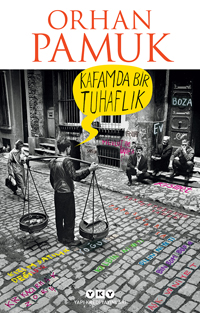Top Qs
Timeline
Chat
Perspective
A Strangeness in My Mind
2014 novel by Orhan Pamuk From Wikipedia, the free encyclopedia
Remove ads
A Strangeness in My Mind (Turkish: Kafamda Bir Tuhaflık) is a 2014 novel by Orhan Pamuk. It is the author's ninth novel. Knopf Doubleday published the English translation by Ekin Oklap in the U.S.,[1] while Faber & Faber published the English version in the UK.[2]
The story takes place in Istanbul, documenting the changes that the city underwent from 1969 to 2012. The main character is Mevlut, who originates from central Anatolia and arrives as a 12-year-old boy; the course of the novel tracks his adolescence and adulthood.[3] Mevlut gets married in 1982, and finds a lack of success in making money.[4]
Elena Seymenliyska of The Daily Telegraph described the book as "a family saga that is as much an elegy to Istanbul as to its generations of adopted residents."[5] Publishers Weekly stated that "what really stands out is Pamuk's treatment of Istanbul's evolution into a noisy, corrupt, and modernized city."[1] Kirkus Reviews states that the author "celebrates the city’s vibrant traditional culture—and mourns its passing".[4]
The novel is almost 600 pages long. Dwight Garner of The New York Times wrote that the book has "the stretch of an epic but not the impact of one."[6]
Remove ads
Characters
- Mevlut Karatas – Mevlut was born in Konya Province in 1957 and moves to Istanbul at age 12,[7] during the summer of 1969.[5] Early in the novel he attends Atatürk Boys' Secondary School,[3] and he sells yogurt and boza.[1] Kirkus Reviews describes him as a "nice guy" type person.[4] One character describes Mevlut as "a bit of a weirdo, but he's got a heart of gold."[6]
- Rayiha – Mevlut ends up marrying Rayiha even though, in the course of writing love letters to her, he thought he was writing to her younger sister; it turns out the younger sister is named Samiha, but he chooses to marry her anyway and they have a happy relationship.[3]
- Süleyman – Mevlut's cousin, he tricks him into writing letters to Rayha instead of Samiha, because Süleyman wants Samiha.[4]
- Korkut – Another cousin of Mevlut. Kirkus Reviews describes him as an "odious right-wing" person who "treats his wife like a servant".[4]
- Mustafa – Mevlut's father[5]
Remove ads
Style
According to Garner the author was able to write "alert, humane, nonwonky prose" as a result of researching varied topics.[6]
Seymenliyska stated that the novel uses the same voice regardless of which of the characters are speaking. Sometimes characters speak directly to the reader.[5] Dwight Garner wrote that the narrators "contradict one another as if they were talking heads in an early Spike Lee movie."[6]
According to Garner, the 2015 English version has humor that "flows freely" and was "lucidly translated".[6]
Remove ads
Reception
Seymenliyska rated the story four of five stars.[5]
Garner stated that the author had done a good job with research, but while Garner "was not deeply, viscerally bored" with the novel he "mostly turned its pages with polite interest rather than real desire."[6]
Kirkus Reviews stated "Rich, complex, and pulsing with urban life: one of this gifted writer's best."[4] Kirkus named it as one of the "Best Fiction Books of 2015".[8]
The book was shortlisted for the 2017 International Dublin Literary Award[9] and the 2016 International Booker Prize.[10]
References
External links
Wikiwand - on
Seamless Wikipedia browsing. On steroids.
Remove ads

